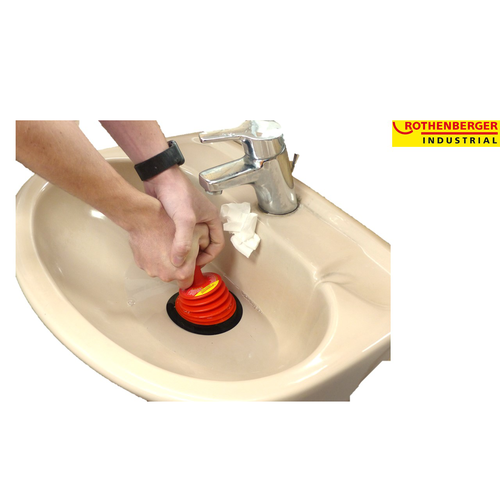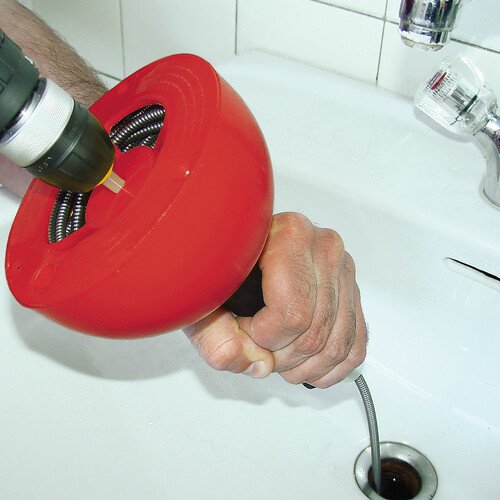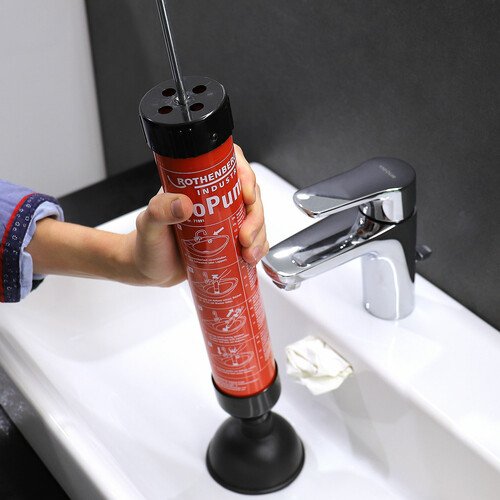
Pipe Cleaning
Problemstellen lokalisieren & Begutachten
1. Locate and inspect the problem area:
Problem areas and pipe blockages can have many causes. They can be caused by grease, hair, food residues or other substances, some of which are accidentally or unknowingly washed down the drain. However, lime deposits on pipe connections can also be the cause.
For example, fats and oils are initially liquid when they come out of the hot pan or at room temperature, but when they come into contact with the cold pipe and cold water they stagnate and get stuck in the pipe. Other things such as hair or food remains can then adhere to these solidified fats and a blockage is not far away.
First of all, the problem area must be located and closely observed so that the right measures can be taken. But how do you find it best, when usually only a few centimetres can be seen inside the pipe?
The easiest way to detect such a blockage is to use an inspection camera. With the long elastic cable or even the gooseneck extension you can penetrate particularly deep into the pipe. An LED light attached to the camera provides the best view, even in very dirty pipes.
Mögliche Ursache des verstopften Abflusses
- Fette, Haare, Essensreste oder andere Stoffe, die teils versehentlich oder unwissentlich im Abfluss herunter gespült werden.
- Kalkablagerungen an Rohrverbindungen
Beispielsweise sind Fette und Öle zunächst flüssig, wenn sie aus der heißen Pfanne kommen oder Raumtemperatur haben. Kommen sie mit dem kalten Rohr und kaltem Wasser in Verbindung stagnieren sie und bleiben im Rohr hängen. An diesen verfestigten Fetten können sich beispielsweise Haare oder Essensreste hängen bleiben und der Abfluss verstopft.
When you have found the troublemaker, you can either see directly what it is, be it hair, is it lime or a mixture of all of these? Then you should make a gradation, how much the tube or the spot is dirty, so if it is light, medium or heavy pollution. If you are not sure, you should show the photos from the inspection camera to an expert and consult his opinion.
- Light soiling can only be removed selectively and with simple methods. This is a small fat deposit or hair in the pipe.
- A medium soiling is already slightly more extensive. It can also be recognized in advance by the fact that the water runs off noticeably more slowly. It can be whole food remains and coarse lime deposits.
- If the water is very dirty, it drains very poorly or not at all. In this case it is usually a mixture of everything or particularly coarse dirt. Most of the time the camera cannot see much of the original pipe anymore.
Hausmittel zur Lösung von Verschmutzungen
2. home remedies to solve pollution instead of expensive and toxic chemicals
Chemicals from the various drugstores are usually neither good for the environment nor for the pipe itself. That's right, pipe cleaners often contain very aggressive chemicals that can attack the surface structure of a pipe, so they often cause more damage than good.
In most cases, simple household remedies such as boiling water, baking powder or vinegar essence will help. In more severe cases, different types of tools such as the classic suction-pressure pump or a pipe cleaning spiral may be used.
What is used when?
For light soiling, such as settled fat, it often helps to simply pour boiling water directly into the spout. Most fats should then become liquid again and run off with the waste water.
If this life-hack did not help or if the water still runs off slowly, it is possible that other impurities such as hair or lime get stuck in the pipe. Depending on how close the dirt is to the drain, you can try to pull it out with a toothbrush or the hook of the endoscope camera. But a simple housewife trick could also be helpful: Baking soda and vinegar! Put three tablespoons of baking powder into the drain and pour a cup of vinegar essence. After it has stopped bubbling, pour in just a cup of hot water and with a little luck the pipe should be clear again.
If the pipe is still dirty or the dirt is very stubborn, only real tools will help. Here the well-known suction bell can be helpful. The sink or wash basin must now be filled until the suction bell is completely under water. Then the Pumps must be moved carefully up and down. In this way the solid dirt is loosened with even over- and underpressure. If there is still lime scale contamination in the drain, a specialist must be consulted!
3. pipe cleaning spiral
Pipe cleaning spirals consist of a strong but flexible spring-like coated wire. Thinner spirals run better and more smoothly through pipes, but can deform and expand and loosen more easily. Thicker spirals are usually more stable but are somewhat harder to pass through pipe systems.
At the beginning of a pipe spiral is the drive, this can be operated manually or with the help of a suitable connection via a cordless screwdriver.
Due to the flexible spiral and the continuous rotation of the drive, the spiral rotates in the pipe and the dirt is scraped off the walls of the pipes and can then be easily rinsed away with water. The spiral is subjected to torsional stress. In this way the spiral builds up sufficient tension through the rotation of the motor. If the spiral is at the end of a pipe and the torque becomes too high, it can overturn and it is particularly difficult to remove it from the pipe, so this should be avoided at all costs. If the torque increases, this is noticeable, but most noticeable in the hand crank.
At the end of the spiral is only an open wound tip on simple spirals. Professional tools often have replaceable drill bits with claws.
Attachments can be various pipe tools, it can be a milling cutter, a leaf drill, a twist drill or a club drill.
Werkzeug gegen verstopften Abfluss
Wenn die Hausmittel nicht helfen und das Rohr immer noch verschmutzt ist, hilft nur noch echtes Werkzeug:
- Saugglocke (Pömpel)
Ein klassischer Pömpel ist vom Aufbau her vielleicht das einfachste, aber nicht immer das effektivste Werkzeug. Bei schweren Verstopfungen ist die Arbeit sehr kraftaufwändig. - Rohrreinigungsspirale
Mit einer Rohrreinigungsspirale sind Sie grundsätzlich immer gut beraten. Sie entfernt so gut wie jede Schmutzart aus Ihren Rohren, gilt aber eher als Profiwerkzeug und ist nur bei sehr starken Verschmutzungen wirklich nötig. - Saugdruckpumpe
Die Saugdruckpumpe ist einfach in der Handhabung, nicht besonders teuer in der Anschaffung und für die meisten Verschmutzungen geeignet. - Eine Endoskopkamera ist allemal sehr hilfreich und kann auch in vielen anderen Gebieten eine echte Erleichterung darstellen.
Saugglocke

- Das Spühl- oder Waschbecken muss gefüllt werden, bis die Saugglocke vollständig unter Wasser ist.
- Anschließend muss der Pompes vorsichtig nach oben und unten bewegt werden. So werden bei gleichmäßigem Über- und Unterdruck die festen Verschmutzungen gelöst.
- Sind weiterhin Kalkverschmutzungen im Abfluss muss ein Fachmann zu Rate gezogen werden!
Rohrreinigungsspirale
Rohrreinigungsspiralen bestehen aus einem festen, aber flexiblem federartigem ummanteltem Draht:
- Dünnere Spiralen laufen besser und geschmeidiger durch Rohre, können sich aber leichter verformen und ausweiten und lockern.
- Dickere Spiralen sind meist stabiler, gehen aber etwas schwerer durch Rohrsysteme.
Am Anfang einer Rohrspirale ist der Antrieb, dieser kann manuell oder mit Hilfe eines passenden Anschlusses über einen Akku-Schrauber bedient werden.
Funktionsweise
Durch die flexible Spirale und die andauernde Rotation des Antriebs dreht sich die Spirale im Rohr und die Verschmutzungen werden von den Wänden der Rohre gekratzt. Sie können anschließend ganz einfach mit Wasser weggespült werden.

Die Spirale wird mit einer Torsionsspannung versetzt. So baut sich durch die Rotation des Motors genügend Spannung auf.
Das Ende besteht bei einfachen Spiralen aus einer offen gewickelten Spitze. Bei professionellen Geräten sind oft austauschbare Krallen befestigt. Aufsätze können verschiedenste Rohrwerkzeuge sein, z.B. Fräser, Blattbohrer, Spiralbohrer oder Keulenbohrer.
Auf zu großen Drehmoment achten
Steht die Spirale am Ende eines Rohrs an und wird das Drehmoment zu groß, kann sie sich überwerfen. Dann ist es besonders schwer, sie wieder aus dem Rohr zu entfernen. Das sollte daher unbedingt vermieden werden. Wenn sich das Drehmoment erhöht, ist dies aber meist zuvor in der Handkurbel spürbar.
Saugdruckpumpe
Saugdruckpumpen sind besonders einfach in der Handhabung und dabei außerordentlich effektiv:

- Ihr pistolenartige Aufbau sorgt für einen stabilen Griff.
- Am Ende des Schaftes ist eine Pumpe integriert, mit der ein Unterdruck erzeugt wird. Dadurch kann der Abzug ruckartig aufgelöst werden.
- Am Ende des Gerätes gibt es einen Gummiaufsatz, der an den verstopften Abfluss bündig angelegt wird. Der Überlauf muss hierfür verstopft werden. Dazu eignet sich ein Handtuch oder ähnliches.
Eine Saugdruckpumpe kann mit dem passenden Zubehör Aufsatz auch für die Toilette verwendet werden.
Welches Werkzeug ist das richtige?
5. which tool is the right one?
A classic plunger is perhaps the simplest, but not always the most effective, and in the case of serious blockages it is also very power-intensive. You are always well advised to use a pipe cleaning spiral and it will remove almost any type of dirt from your pipes, but it is considered to be a professional tool and is only really necessary in the case of very heavy soiling. The suction pressure pump is easy to handle, not very expensive to purchase and suitable for most types of dirt. An endoscope camera is always very helpful and can also be a real relief in many other areas. Now it is your decision which pipe tool is best suited for your purposes. WALTER offers a wide range of these and also has access to an extensive range of particularly high-quality ROTHENBERGER Industrial tools.
 Very good (4.66 / 5.00)
Very good (4.66 / 5.00)






